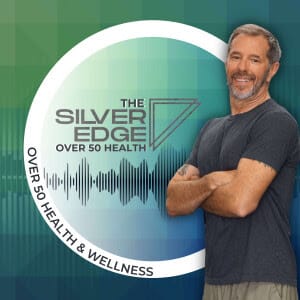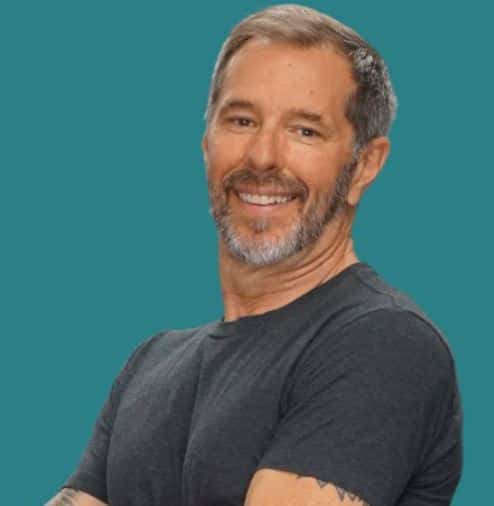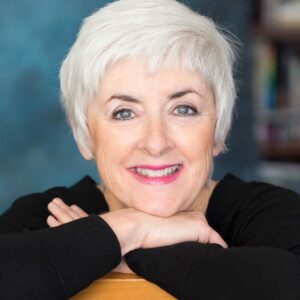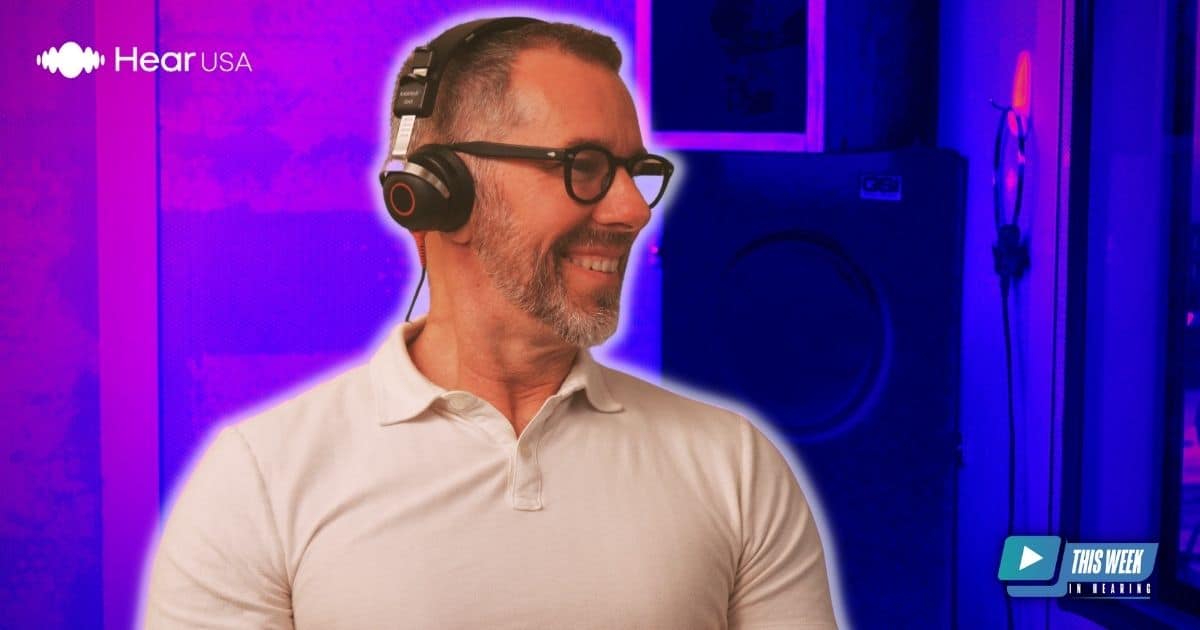In this engaging conversation with Gael Hannan, wellness and nutrition expert Kevin English recounts his transformative journey to improved health and addressing his hearing loss. Confronting challenges of weight, inactivity, and stress in his 40s, Kevin initiated substantial lifestyle changes after a hospitalization wake-up call.
 Over the next decade, he honed healthy habits, and now approaching 60, Kevin serves as a full-time online nutrition coach and personal trainer, a testament to his commitment to holistic wellness. He is also the host of the popular podcast ‘The Over 50 Health & Wellness Podcast‘.
Over the next decade, he honed healthy habits, and now approaching 60, Kevin serves as a full-time online nutrition coach and personal trainer, a testament to his commitment to holistic wellness. He is also the host of the popular podcast ‘The Over 50 Health & Wellness Podcast‘.
Despite years of family jokes about needing hearing aids, Kevin initially denied his hearing loss until a podcast interview with the CEO of HearUSA prompted him to undergo testing, revealing significant hearing loss.
Embracing hearing aids markedly enhanced his participation in group conversations, leading Kevin to champion the importance of holistic wellness, particularly emphasizing the critical role of healthy hearing in cognitive health. Kevin advocates for a well-rounded approach to health, highlighting the significance of regular exercise, proper nutrition, stress management, and quality sleep. He explores how proactive management of hearing health contributes to overall well-being, opening up new possibilities and enhancing life’s quality at any age.
- You can check out The Over 50 Health & Wellness Podcast here
Full Episode Transcript
Welcome
to This Week in Hearing.
I’m Gael Hannan.
This week I’m so pleased to be
talking with Kevin English.
He
is a man who at one point in
his life was less than fit,
less, less than healthy,
and he changed all that.
And his new healthy lifestyle
grew to expanded to include
hearing health.
So Kevin is the owner of Silver
Edge Fitness in Wilmington,
North Carolina,
and
also the host of the popular
over 50 health and wellness
podcast.
Welcome, Kevin. Thanks,
Gael. Glad to be here.
Excited
to have a conversation
about
hearing health.
Always happy to talk about
hearing health.
So
we’re going to have kind of a
free ranging conversation
here for a few minutes.
But
what I wanted to just start
off is tell us about a little
bit about your story,
your
transformation from how you
used
to be to how you are now.
And then we’ll talk about your
hearing loss. Sure. Thanks.
Yeah.
So my fitness story probably
starts the interesting part,
I suppose in somewhere in
my early to mid 40s,
I ended up just being as sick
and unhealthy as I’ve ever
been in my life.
And this actually ended up in
a three day hospital stay.
I was overweight,
I was just stressed
out of my mind.
I had a very sedentary
lifestyle.
I was more invested in
my career, I suppose.
Drinking daily just had all
these
very unhealthy habits and
it just ended up not well.
Right.
I found myself very sick.
And as I kind of looked
around at my peers,
those other guys my age,
mid 40s,
I saw that that kind of
was pretty common.
There were a lot of us
that were overweight,
a lot of us were sedentary.
A lot of us just weren’t really
focusing on our health.
And I’m talking about health
now in a holistic aspect.
Just obviously your physical,
biological health,
but also mental health,
spiritual health,
emotional health.
There didn’t seem to be a very
positive role model in my
immediate circle of people
that I was close with.
And
I kept hearing this message,
well,
that’s very fatalistic.
It’s all downhill from here.
And that’s just how it is.
What
happens when you get old?
Doesn’t it suck?
And kind of ha ha ha
And I thought,
well, wait a minute,
is that my reality?
Is that what I need
to accept now?
And that’s what started me
on this journey. First,
I didn’t want to be sick.
so I started doing things
to be not sick,
just taking basic care of
myself.
But in order to do that,
I had no idea what to do.
I
knew that things like drinking
every day probably
not real healthy.
I knew that eating a lot of fast
food, probably not so healthy.
I knew that I needed
to exercise.
So I went down the Google
rabbit hole,
started researching healthy
habits
and how to optimize your
health and how to lose weight
and all these things.
Long story short is I tried
a lot of everything,
and I can now say,
I’m almost 60.
I’ll be 60 in the spring,
and I’ll tell anybody who will
listen, I’m as strong, fit,
and
healthy as I’ve ever been in
my entire life. So I spent,
really,
the last decade after
I got un-sick, right.
So I was not sick anymore.
That led me to say, well, okay,
what else is there?
Can
I really optimize from here?
And
so that led me eventually to
I
retired from my corporate job
that I’d had for 22 years,
and I’m now a full time online
nutrition coach and
personal trainer.
So I’ve worked with men
and women in their.
Who are looking to transform
their health at this stage
of their life.
Wow.
Well, I’m over 50,
substantially over 50.
so I want to talk more about
that a little bit later.
But as a hearing loss and
hearing health advocate,
I’m passionate about talking
about hearing loss.
So you have hearing loss.
So tell us about that.
When did you discover that?
Okay. Yeah.
there’s been a running joke
in my family going back.
My kids are grown out of the
house, but every birthday,
every Christmas,
every Father’s Day,
the joke would be,
this is the year that dad
gets hearing aids.
Because
I kept hearing from my
family, you didn’t hear us.
You didn’t hear us.
You didn’t hear us.
And I thought to myself I
don’t have hearing loss.
I just denied it.
And they would say that,
and I would laugh. Hahaha
That’s really funny.
And I ignored it, frankly.
And there were signs looking
back that I did have hearing
loss. It was very,
very difficult for me,
especially in,
say a social environment.
I was a salesperson.
I spent many evenings with
clients in restaurants
where it’s noisy.
when
I was out with friends and
family at parties it was
pronounced that I just wasn’t
picking up all of the
conversation.
I just figured it’s because
it’s noisy, right?
And
everybody can’t hear in that
environment. But very often,
my wife
would elbow me and said,
he’s talking to,
you’re being rude.
And I missed it.
I
completely missed that piece
of the conversation.
And
then a funny thing happened.
so you mentioned in the intro
that I have a podcast,
and I had the CEO,
James Gilchrist,
at the time of HearUSA on my
podcast to talk about hearing
health. I thought, well,
this would be a subject that’s
interesting
to my demographic.
Right?
And throughout that
conversation,
I told him that story I just
told you. I said, yeah,
my
wife and kids are constantly
badger me.
You need hearing aids.
You need hearing. I said, well,
have
you had your hearing check?
And I said,
I think I did a long time ago.
But at any rate,
that’s really the catalyst that
started me on this journey in
terms of hearing health.
I went and got my
hearing tested.
I went to a HearUSA center.
Lo and behold, no surprise.
Yes,
you have some hearing loss,
and they test specifically for
hearing
in noisy environments.
Yeah,
you’re really having
difficulties there.
And
they set me up with hearing
aids and sent me on my.
It was I’m not going to lie,
it made a huge difference
for me,
especially in those
social situations.
I spend most of my day,
I work from home.
It’s quiet here in the daytime.
It’s
not a challenge for me here
when I’m doing a podcast.
And you saw,
when I first came on,
I had a headset on,
so I’m really in tune there.
But when I’m out in public,
when I’m out in social
situations,
I realize now that a lot of my,
I guess,
social anxiety for being in
those
groups was due to the fact
that I just can’t hear.
I have to be really on and
paying
attention and focused at
who’s
talking and really leaning
in to make sure I’m not left
out of the conversation.
And now that I’ve corrected
my hearing,
that’s much less of a
challenge for me.
It’s much
more comfortable going
out in these situations,
just being able to participate
in the group, basically.
So that’s kind of how
I ended up here.
Two things jumped
out at me there.
First
of all was how you denied
your hearing loss,
even though your family
repeatedly told you that you
were not hearing the way that
you could or should.
but we continue to deny it,
even in the evidence.
if our family tells us
we have hearing loss,
we have hearing loss.
That is the best
clue that we can get.
So,
eventually
we all
have something that makes
it a change. And for you,
it was that conversation with
someone
else who I’m not sure
whether he had hearing loss,
but
let’s call him a peer,
because
when you talk to someone
else who has hearing loss,
that can be life changing.
And your evidence of that.
good for you. Good for you.
So
I wanted to ask you about the
philosophy of healthy aging.
how does healthy hearing
fit into that?
Yeah, that’s a great question,
frankly,
one I really didn’t consider
until my own personal journey
here recently.
we now know,
and
I now know that hearing loss
is
correlated with dementia and
with Alzheimer’s and with
other conditions. Right.
But
I have been a champion of
holistic, healthy aging.
That’s my jam.
That’s what I do for a
living these days.
I’m very passionate about it.
And when we talk about
holistic health,
we
can’t ignore hearing health,
right,
especially in my age
demographic.
And it’s just really an
important part of
acknowledging and testing,
just
like you would acknowledge.
Hey, you’re overweight. Hey,
your blood sugar is high.
Hey, your cholesterol is high.
These are all things that if you
were to tell me those things,
I’d say, okay, we need a plan,
we need a roadmap,
we
need a blueprint for solving
this, for correcting this.
And it’s no different with
hearing health. Right.
If you have hearing loss,
then it is incumbent upon
yourself to take responsibility
for your health,
get that tested and find out
what your options are
for correcting that.
I just
wanted to make a comment
about the connection
to dementia.
The studies show that it is
untreated hearing loss.
I’ve read that you can actually
reverse that by correcting
your hearing loss. Yeah.
Or you can diminish it.
Absolutely.
for me, it’s not just hearing,
it’s communication,
and it’s all about
this connection.
So
when we lose our connection
with other people,
and that’s often you’ll see in
the elderly because
they can’t hear,
or for whatever
that has impact on our health.
And
so it’s about communication.
getting hearing aids helps
you hear better,
but it also is part of
communicating better.
I will never hear
perfectly well.
I will never hear well again,
although
with lifelong hearing
loss, I’ve never heard well,
but I can communicate better.
And I think that’s the
underlying thing.
You’re
about communication with
your
body and with your health
and with other people.
So
it’s a really good point that
I wish more people realized.
so the reverse of that,
how can a healthy lifestyle,
and you probably experienced
this
based on what you told me,
how is improving our health
and our lifestyle,
how does that
help
us improve or deal with the
stress that we feel as people
with hearing loss?
deal with our hearing loss
and our tinnitus.
I don’t know if you have
tinnitus, but many of us do.
You are lucky. You are lucky.
Send up a little prayer for
that. But many of us do.
tell me about how a healthy
lifestyle can help reduce
stress. Yeah. So basically,
you can think of a healthy
lifestyle as the tide in the bay
and all of the boats rise
when that tide comes in.
So when we take care of
our bodies, again,
I’m talking holistically.
So I’m bringing in the mental
aspect, the emotional aspect,
the spiritual aspects
of health as well.
But
even just when we talk about
moving our bodies regularly,
so
getting that exercise and we
talk about proper nutrition,
when we are healthy,
we show up as the best
version of ourselves,
the most capable version of
ourselves,
the most passionate,
purpose driven of ourselves
version of ourselves.
We
show up as better sons and
daughters and parents and
grandparents
and siblings and
coworkers
and bosses when we
have this regular practice
of self care.
And
the opposite of that is when
we allow our health
to deteriorate.
And certainly your hearing
health
would be in this bucket.
Our world gets smaller and
smaller and smaller.
And then as we improve
our health,
our world gets bigger
and bigger.
We have more opportunities,
more.
There’s just more of the world
that’s open to us when we’re
healthy and vibrant and
confident and competent.
And certainly I think that all
of that
goes a huge way towards,
like I said,
it’s all of those boats rising.
And
there’s several things that
being healthy includes.
And it’s not just lifting
weights or getting your cardio
or eating your vegetables or
ensuring you’re getting
whole foods.
But there’s other things like
managing your stress load.
And
although you may not be able
to manage your stress,
you can manage how
you react to it.
It’s learning to connect deeply
with
loved ones and overcoming
loneliness, et cetera,
because we’ve got this
loneliness epidemic now.
It’s learning to get healthy
sleep and having that
really healthy,
steady
sleep every single night.
So all of these things will help
improve
the way you show up in
the world and whatever that
means to you, right.
It’s going to help you shine
your brightest if you’re really
invested in a regular practice
of self care.
I love that.
a couple of years ago,
I took a mindfulness course,
and I
really felt changed. After that,
I had a new tool,
and I find that deep,
intentional breathing.
All our lives,
we’re told if you’re stressed
out, like, take a breath,
just stop and take a breath.
And there’s a reason for that.
So intentional breathing
and for me, meditation,
just even a few minutes it just
calms those neural pathways,
and
it actually quietens to some
degree the noise in the head.
when I exercise in a day when
I’m actually getting
heart pumping,
cardiovascular stuff going,
it has the same effect.
Obviously,
it
doesn’t completely eliminate
but it does help me
manage my stress,
and that was a real
big change for me.
A
woman who’s lived all her life
with
hearing loss and who’s been
an advocate for 30 years,
almost now learning
these new tools.
And I think that’s important.
There’s always something we
can do to make it better,
to live better.
I love that, Kevin,
thanks for sharing that with
the words that, you know,
I think they resonate with me,
and I’m sure they’ll resonate
with others.
Are there any other little tips
that you have for us before
we sign off? Well,
I would certainly say it can
seem really overwhelming,
and there’s an overwhelming
amount of information
in my industry,
in the health fitness exercise
space. And really,
it’s a matter of just the basics
and almost common sense.
But realizing that
you have agency,
your health is more in your
hands than you think.
there
are lifestyle changes you
can
make that can dramatically
improve your quality of life,
but really,
it’s not up to your doctor.
Your doctor is there
to keep you,
to
help you when you get sick,
to help you be un-sick.
They’re not there to optimize
your health. That’s up to you.
And so when you look at your
health and caring for yourself
and
remember, I use those words,
this intentional practice of
self care, this regular,
intentional practice
of self care,
all of that’s 100% up to you.
And just seek out peers,
mentors,
coaches
that you resonate with
that take a health first,
long term,
holistic view of your health.
I would just kind of leave you
with that. I love that.
So it is up to me,
but I honestly can’t do it
on my own. I need help.
I need resources.
thank you for that message.
what we’ll do,
we’re
going to put your website
and
your podcast for people to
see they want to get in touch
with you because I really
appreciate
your message and your
understanding
of where hearing
health fits into the
big picture.
Hearing aids are a wonderful
first step,
and
there are other things that
we can
do to communicate better.
Communication
is the glue that
connects us as people to each
other. So it’s very,
very important.
Kevin
English thank you so much
for spending this time
with us today,
and
I wish you a happy new year.
And so thank you very much.
Thanks, Gael.
It’s been a pleasure.
Be sure to subscribe to the TWIH YouTube channel for the latest episodes each week, and follow This Week in Hearing on LinkedIn and Twitter.
Prefer to listen on the go? Tune into the TWIH Podcast on your favorite podcast streaming service, including Apple, Spotify, Google and more.
About the Panel

Kevin English, a leading advocate for healthy aging, is the founder of The Silver Edge, an online fitness and nutrition platform dedicated to empowering individuals over 50 to cultivate lean, healthy, and capable bodies. Renowned for his vitality, Kevin guides men and women to redefine strength, enabling them to embrace the latter half of life with optimal health.
As the host of the Over 50 Health & Wellness podcast, Kevin challenges the conventional notion that aging means a decline in well-being. Through a mix of wisdom, inspiration, and practical advice, he educates and uplifts his audience, fostering a collective movement toward making the second half of life the most vibrant.
Kevin is reshaping the narrative of aging, advocating not just for survival but for thriving, transforming the golden years into a period of renewal, strength, and boundless possibilities.
 Gael Hannan is a writer, speaker and advocate on hearing loss issues. In addition to her weekly blog The Better Hearing Consumer, which has an international following, Gael wrote the acclaimed book “The Way I Hear It: A Life with Hearing Loss“. She is regularly invited to present her uniquely humorous and insightful work to appreciative audiences around the world. Gael has received many awards for her work, which includes advocacy for a more inclusive society for people with hearing loss. She lives with her husband on Vancouver Island, British Columbia, Canada.
Gael Hannan is a writer, speaker and advocate on hearing loss issues. In addition to her weekly blog The Better Hearing Consumer, which has an international following, Gael wrote the acclaimed book “The Way I Hear It: A Life with Hearing Loss“. She is regularly invited to present her uniquely humorous and insightful work to appreciative audiences around the world. Gael has received many awards for her work, which includes advocacy for a more inclusive society for people with hearing loss. She lives with her husband on Vancouver Island, British Columbia, Canada.







